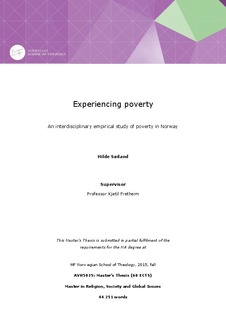Experiencing poverty. An interdisciplinary empirical study of poverty in Norway
Abstract
Academic works on poverty are often concerned with how to measure or define this complex phenomenon. This thesis instead adds to poverty research by focusing on experiences of poverty, exploring what poverty is through the stories of those living in economic deprivation in Norway. The Norwegian context is particularly interesting due to the exceptionally high average living standards which create an unusually large gap between the poor and “everyone else”. Qualitative, semi-structured interviews with five anonymous informants were conducted in order to get new insights into the challenges the poor face in their everyday lives. Their experiences were analyzed within the framework of material, social and psychological “ill-being”, with theoretical perspectives from the academic fields of sociology, economics, psychology and philosophy. The findings point to various degrees of ill-being and a close connection between them; ill-being in one area of life leads to ill-being in other areas. Further, there is a cultural aspect to poverty, where lack of purchasing power leads to shame and social exclusion. The findings have generated new theory in the form of ten ideal types, inspired by Max Weber. Four of them represent different types of social exclusion, and six demonstrate coping mechanisms in the face of poverty. These ten ideal types are a unique contribution to poverty research, serving as a starting point for new models and theories on poverty in Norway and elsewhere.
